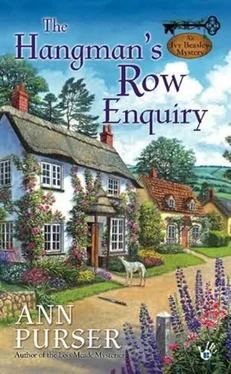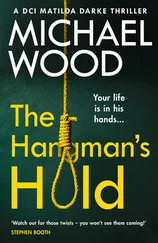
Ann Purser
The Hangman’s Row Enquiry
The first book in the Ivy Beasley series, 2010

“IF YOU ASK me,” said Ivy, lifting the teapot lid and peering inside, “he’s got something to hide. Moved into Hangman’s Row, so they say, and living on his own. A bit smarmy. I wouldn’t trust him as far as I could throw him.”
“That’s not very far, then,” said her cousin Deirdre, with a smile, knowing that Ivy belonged to a generation of country families whose first reaction to a newcomer was suspicion.
Ivy scowled at her. Anybody would think she was having tea with the Queen, she thought acidly, observing Deirdre, well groomed from top to toe.
Former lifelong scourge of the village of Round Ringford, Ivy Beasley had moved, under considerable pressure from Deirdre, to Springfields luxury retirement home in Barrington, in the county of Suffolk.
As Ivy had yet to admit, Barrington was a beautiful village, each house a jewel, with its ornamental plasterwork and ancient timbers, originally built to serve the folk at the Hall. It was an estate village, and had all once belonged to the squire, but recently Theodore, the latest in a long line of Roussels, had raised much-needed money by selling off most of the houses. He told friends he felt a traitor to his ancestors and vowed his descendents would always own and live in the Hall itself. As he was a bachelor with no apparent intentions of marrying, the village was sceptical.
“They say Theodore Roussel has upped the rent for this new man,” Deirdre said. “What’s his name, anyway?”
Ivy shrugged. “Don’t ask me,” she answered. “I’m not one for gossip, as you know.”
Deirdre swallowed a sharp retort, and said, “He won’t have much fun with his neighbours.” She helped herself to another biscuit from Ivy’s tea tray. “You can’t get much drearier than old Mrs. Blake and Miriam. Sometimes you can see Miriam peering out from behind the curtains. I feel sorry for her. She’s not that old, and had a good job once, so they say.”
“I’ve seen her in the shop,” Ivy said. “Only time she gets out.”
“She should take a stand,” said Ivy, pushing back into place a strand of iron grey hair that had had the temerity to stray from under her “invisible” hairnet. Her sharp, beady eyes behind steel-rimmed glasses clouded as she added, “My own mother was similar, and I left it too late. Had me under her thumb until she passed away. And even then she used to come back and haunt me. I don’t think she approves of Barrington, though. Haven’t heard from her since I arrived.”
“That’s one good thing, then,” said Deirdre promptly. She was finding her plans for caring for her elderly cousin more tricky than she had supposed, and her daily visits to Springfields were more of a duty than a pleasure.

HANGMAN’S ROW, A small terrace of three cottages, was still in Roussel hands. In spite of its gruesome name, the lane was leafy and shade dappled. It was half a mile or so from Barrington Green, where the local gibbet had once stood as a warning to transgressors. A young farmworker, his wife and baby, lived at one end of the row, with widow Blake and her spinster daughter in the middle cottage. The new tenant was at the far end of the terrace, and had yet to be seen long enough for the locals to pronounce judgement.
Rumours of Roussel’s rent increase were true. A few new coats of paint had smartened up the cottage, and Theodore had found at the local dump a surprising supply of little-used bathroom and kitchen fittings to bring the place up to standard. Satisfied with this, he had advertised the cottage for what he regarded as a more realistic rent than the other two.
It had taken a while to find a tenant, but then curious eyes had seen a tall, middle-aged man with sparse, sandy hair and a hunted look, appear with his grey whippet and a small amount of furniture in a Thrifty self-drive van.
Augustus Halfhide had so far avoided Miriam Blake, though she had made several approaches to him over the garden fence. Now he watched her return from a visit to the shop. He sighed. She peered into his window and gave a little wave, accompanied by a hopeful smile. “Oh, God,” he said to his little dog Whippy, “it’s just my luck to move in next to a predatory female.”
It looked as if his hopes of having a period of peace and quiet were under threat.
Recently, after his wife had finally left him, he had taken a hard look at himself and decided to begin again. After a life so far filled with action-packed missions in foreign lands, nothing, he had decided, would be better than a remote village, in a community that would not regard him as one of their own for at least twenty-five years. He could spin them a good story, and they would leave him alone to adjust to a different way of life.
Augustus Halfhide, Gus to his friends, could not have been more mistaken.

GUS MET IVY Beasley in church. It was an unlikely place for him to be, but he had felt a sudden urge to observe some of his fellow villagers without necessarily being accosted. He planned to slip into the back pew in the darkened interior and indulge himself by inventing identities for the people in front. Although he wouldn’t admit it, even to himself, he was missing congenial company.
There were very few in church for the service, and among the mostly elderly parishioners his eye was taken by a woman in a solid black coat covering her broad shoulders, and topped with an extraordinary black felt hat like an upturned pudding basin, reminiscent of photographs of his grandmother in a distant past.
When the service finished, he hung back until nearly all had gone, and saw with alarm that he was being approached by the vicar, who held out a welcoming hand.
“New to the village?”
Gus nodded, and said he had moved in a few weeks ago, and was beginning to find his way around. The vicar said how good it was to see him in church, and began a lengthy history of the ancient building. “We have our very own martyr, you know,” he said with a keen smile. “Taken away by the Roundheads in the civil war. The village never saw him again.”
“And you’ll never see our visitor again, if you don’t let him get home to his lunch,” said a sharp voice behind the vicar.
Gus peered gratefully at the figure emerging, and saw that it was the woman with the black hat. She was not smiling, and had a stern and disapproving expression. Now, here was a challenge! Gus prided himself on his way with women, and judged this one was much too old to be predatory. He could safely practise his charm, sadly unused for too long.
“Good day, madam,” he said and bowed his head in greeting.
“Not good. It’s raining,” Ivy Beasley said flatly. “And I’ve forgotten my umbrella.”
“Allow me,” Gus said, stepping forward and offering his arm. In the church porch he put up his city umbrella, picked up from habit at the last minute before leaving home. “Now, which way? And do tell me your name, Mrs… um…”
“Beasley. And it’s Miss. I go up that way, past the shop.”
As they stepped out briskly, Gus discovered that Ivy had come from the village where his old school friend Richard Standing lived.
Читать дальше















